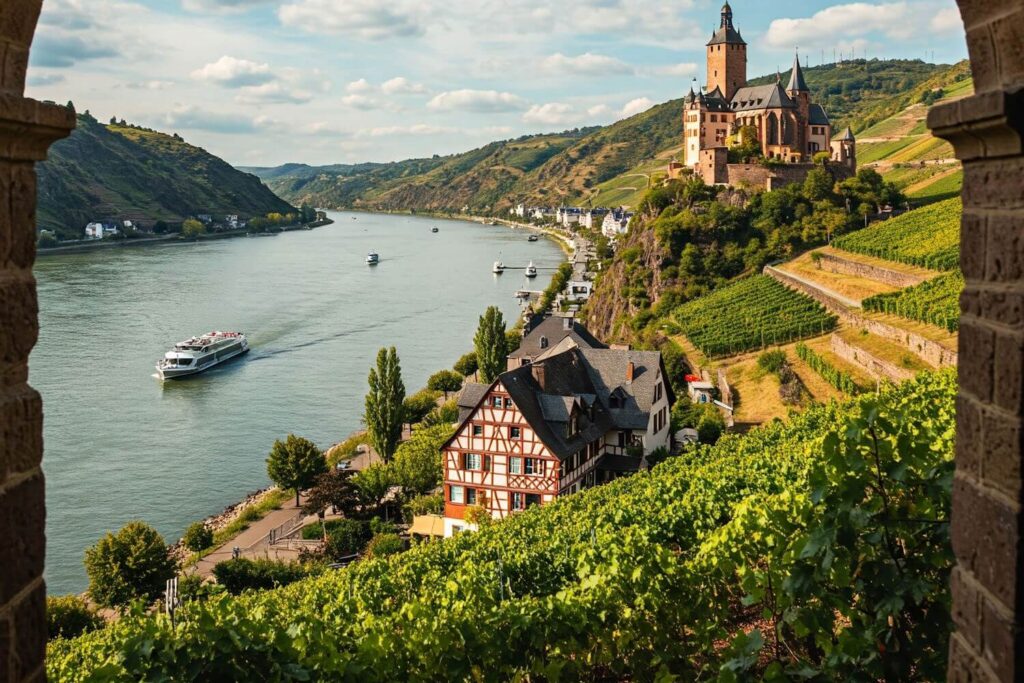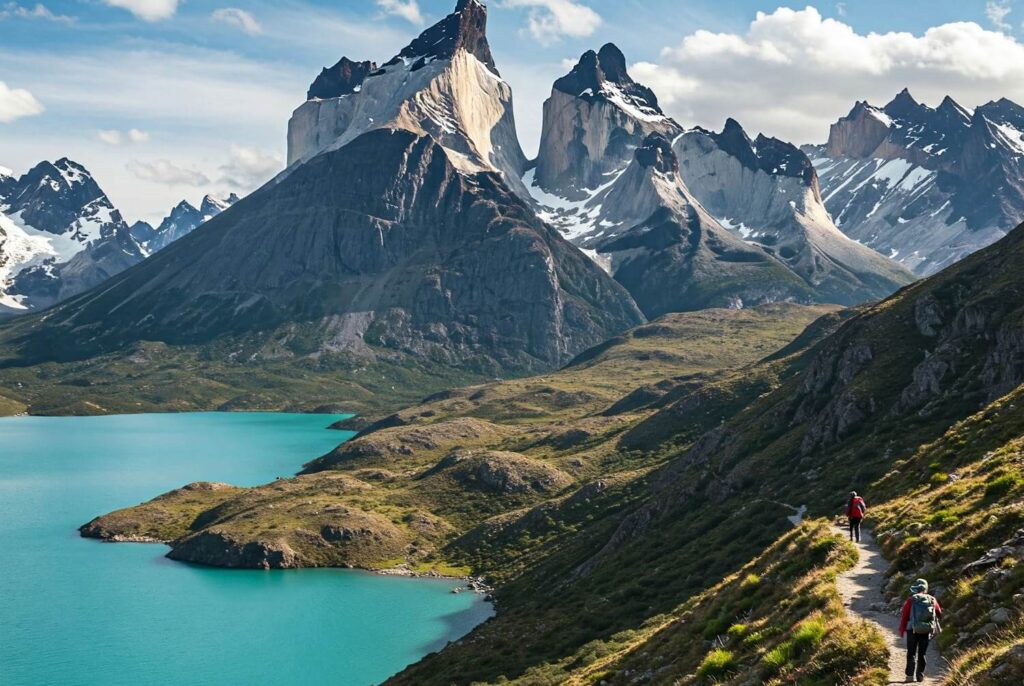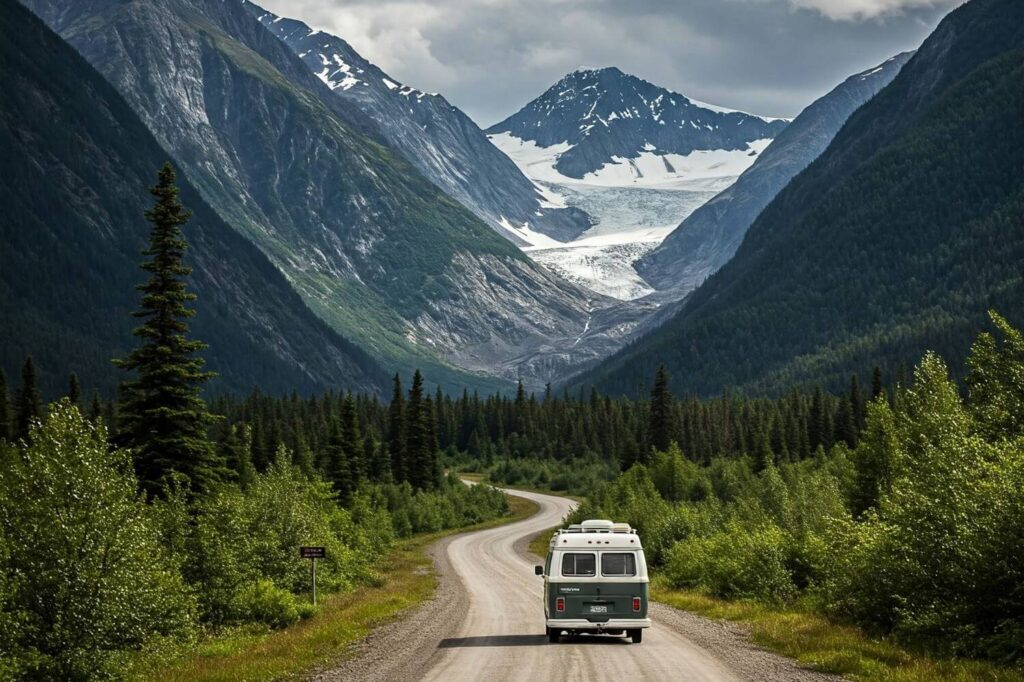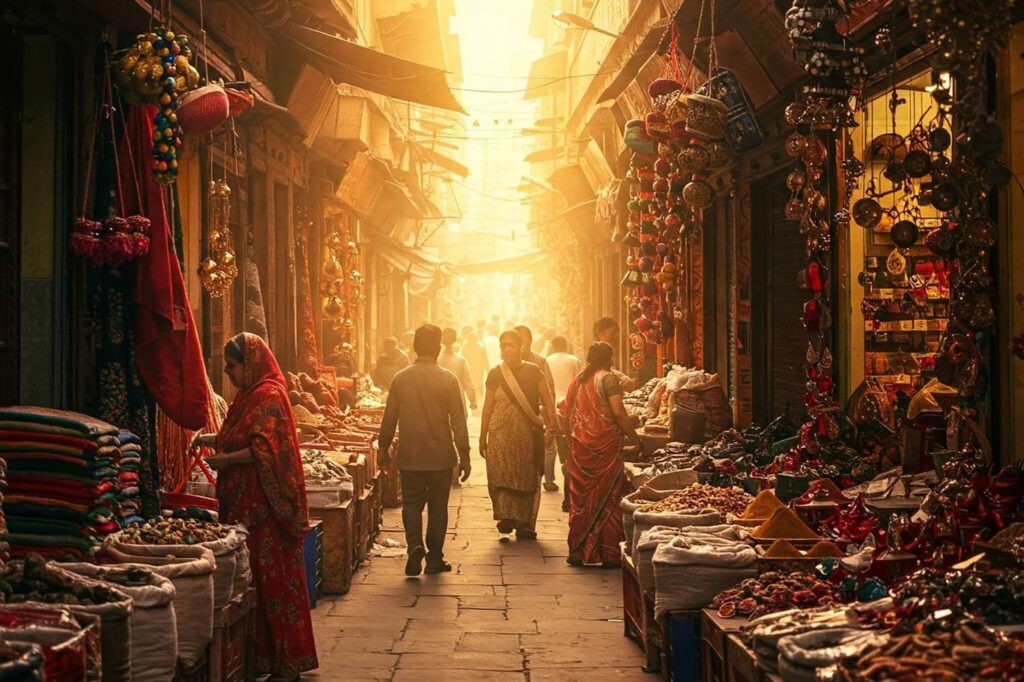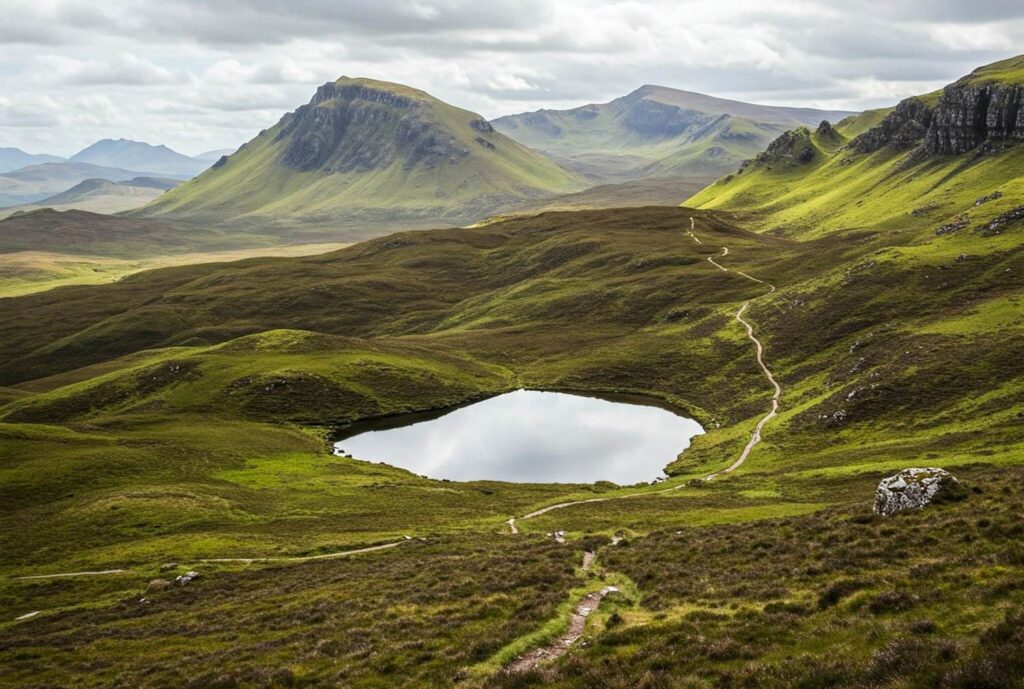Introduction to the Rhine River
The Rhine River, one of Europe’s most significant waterways, flows majestically for approximately 1,230 kilometers through Switzerland, Germany, and the Netherlands. Originating in the Swiss Alps, it winds its way through picturesque landscapes, charming villages, and bustling cities, ultimately emptying into the North Sea. As a critical component of European geography, the Rhine serves not only as a vital transportation route for goods and people but also as a natural boundary between nations, most notably between France and Germany.
The Rhine River has played a formative role in shaping the history, culture, and economy of the regions it traverses. By acting as a conduit for trade and commerce, it facilitated economic prosperity in medieval times and continues to do so today. Numerous castles, many of which date back to the Middle Ages, dot the riverbanks, serving as fortifications and residences for nobility. These historical structures tell stories of power, conflict, and resilience that are intertwined with the development of the territories surrounding the Rhine.
Moreover, the fertile valleys alongside the river provide an ideal environment for viticulture, making it a renowned wine-producing region. The Rheingau, Mosel, and Ahr valleys are particularly famous for their vineyards and high-quality Riesling wines. The Rhine not only offers scenic beauty but also encapsulates the essence of European heritage, evident in the medieval towns that line its shores. Each town has its unique character, reflecting the influences of various historical epochs and the myriad of cultures that have flourished in its proximity.
Traveling along the Rhine River presents an unparalleled opportunity to explore a harmonious blend of natural beauty, cultural history, and gastronomic delights, making it a prime destination for those seeking to immerse themselves in the rich tapestry of European life.
The Magic of the Rhine Valleys
The Rhine River is not merely a waterway; it is a lifeline that has shaped the landscapes and cultures of the regions it traverses. The magic of the Rhine valleys lies in their breathtaking natural beauty, where rolling hills meet the banks of the river, creating a picturesque tableau. This area, renowned for its terraced vineyards, showcases the unique blend of human ingenuity and the rich geographical features of the region. The vineyards cling precariously to the hillsides, basking in the sunlight that nurtures the grape varieties coveted in winemaking. The unique microclimate of the Rhine valleys is a result of the river’s mitigating influence, providing warmth and protecting the vines from harsh weather, thereby enhancing the quality of the wine produced.
Historically, the Rhine valleys have served as a vital corridor for trade and cultural exchange, significantly impacting European history. The castles that dot the landscape not only serve as remnants of medieval times but also as status symbols of the nobility who once ruled this area. Each castle has its own story, contributing layers to the historical fabric of the Rhine. These structures, along with charming medieval towns, stand as testaments to the valleys’ significance in various historical narratives. The towns near the Rhine are often characterized by narrow, winding streets, traditional half-timbered houses, and vibrant local markets, which draw visitors eager to immerse themselves in the culture.
The valleys also play a crucial role in the sustainable development of local communities, as the wine industry supports both tourism and agriculture. Visitors are not just spectators of this beautiful scenery; they become part of the ongoing narrative woven into the fabric of these valleys. As they indulge in wine tastings or stroll through quaint villages, they connect with the rich history and stunning landscapes that have enchanted generations. The Rhine valleys continue to captivate many, ensuring their place as one of the most cherished regions in Europe.
Castles Along the Rhine: A Glimpse into History
The Rhine River is not just a geographical landmark; it is also a repository of history, art, and architecture, particularly exemplified by its stunning castles. These majestic structures, dotted along its banks, showcase the feudal past of the region and have become symbols of its rich heritage. Among the most notable is Burg Eltz, a fine representation of medieval architecture that has remained in the same family for over 800 years. Nestled in the hills overlooking the Moselle River, Burg Eltz stands out for its picturesque setting and complex design, featuring over 100 rooms that narrate tales of knights and nobility.
Another significant structure along the Rhine is Marksburg Castle, renowned as the only castle on the Rhine that has never been destroyed. Its existence dates back to the 12th century and offers a remarkable glimpse into the military architecture of the Middle Ages. Visitors to Marksburg can explore its well-preserved towers, gates, and bastions, providing insight into the lives of those who once occupied the castle. The panoramic views from the castle’s heights add to its allure, making it a popular destination for tourists and history enthusiasts alike.
Lastly, Rheinstein Castle, which was reconstructed in the 19th century, offers a romanticized yet authentic experience of the medieval era. Perched on a rocky promontory, the castle reflects the dramatic and enchanting nature of the Rhine Valley. Apart from its architectural beauty, Rheinstein is associated with numerous legends and lore, adding a mystical quality to its historical narrative. These castles, along with many others strewn across the landscape, collectively serve as a tangible link to the past, inviting visitors to immerse themselves in the historical richness of the Rhine River.
Exploring Picturesque Medieval Towns
The Rhine River is adorned with numerous enchanting medieval towns, each showcasing a unique blend of historical charm and modern vibrancy. Among these, Rüdesheim, Bacharach, and St. Goar stand out as exemplary representations of the region’s rich heritage and cultural depth. Strolling through Rüdesheim, visitors are greeted by narrow cobblestone streets flanked by half-timbered houses that exude a fairytale allure. This town is renowned for its lively wine taverns that offer a taste of the delectable local Rieslings, providing an authentic experience of the Rhine Valley’s winemaking tradition.
In contrast, the town of Bacharach enchants with its medieval walls and the striking ruins of the Post Tower, which date back to the 13th century. Here, the picturesque streets are lined with shops and cafés where one can savor regional delicacies while soaking in the tranquil atmosphere. The locals take pride in their heritage, hosting numerous festivals throughout the year that celebrate traditional crafts, music, and, notably, their exceptional wines. Walking through Bacharach is much like stepping back in time, as the architecture and ambiance vividly reflect the town’s storied past.
St. Goar, a picturesque haven nestled against the riverbanks, is famed for its proximity to the imposing Burg Rheinfels castle. The remnants of this fortress provide insight into the region’s strategic significance during medieval times. Visitors can explore the castle grounds and enjoy breathtaking views of the river and the surrounding vineyards. The vibrant local culture here is palpable, with a strong emphasis on community and tradition. The Rhine Valley’s medieval towns, including Rüdesheim, Bacharach, and St. Goar, beautifully illustrate how modern life coexists harmoniously with the region’s historical heritage, creating an inviting atmosphere for travelers and locals alike.
Vineyards and Wine Tasting Experiences
The Rhine River is renowned for its picturesque vineyards that flank its banks, creating a stunning backdrop for visitors who seek both beauty and indulgence. This region is particularly famous for producing exceptional Riesling wines, which are celebrated for their balance of sweetness and acidity, as well as their ability to reflect the unique terroir of the area. The fertile soil and favorable climate of the Rhine Valley allow vineyards to flourish and yield grapes that are integral to the local winemaking tradition.
Wine tours have become an integral aspect of experiencing the Rhine, offering enthusiasts a chance to explore various vineyards and wineries. Many of these tours include guided tastings where visitors can sample a variety of wines produced in the region, learning about the distinct characteristics of each vintage. In addition to Riesling, wine enthusiasts may also encounter other local varieties such as Spätburgunder (Pinot Noir) and Gewürztraminer, which contribute to the diversity of offerings in Rhine wine cellars.
Visitors can participate in local wine festivals, where the culture of viticulture comes alive. These festivals typically feature tastings, live entertainment, and opportunities to meet local winemakers. They serve as a fantastic platform for individuals to immerse themselves in the regional wine culture, celebrating the craftsmanship that goes into each bottle. Furthermore, many vineyards offer immersive experiences, allowing guests to observe the winemaking process firsthand, from grape harvesting to fermentation.
Some of the most prominent vineyards worth visiting include the Schloss Johannisberg vineyard, known for its historic significance and exquisite Riesling, as well as the Weingut K.W. V. Keller estate that boasts a range of award-winning wines. A journey along the Rhine presents the opportunity to savor not only the scenic vistas of the vineyards but also the chance to indulge in the rich flavors and traditions of the region’s wines.
Activities and Adventures Along the Rhine
The Rhine River, with its picturesque landscapes and rich history, offers a plethora of activities and adventures that are sure to appeal to all visitors. One of the most popular ways to explore the beauty of the Rhine is through river cruises. These cruises provide an unparalleled opportunity to witness the stunning castles, charming villages, and rolling vineyards that dot the riverbanks. With various options available, from leisurely day trips to themed cruises, travelers can tailor their experiences to suit their interests.
For those looking to immerse themselves in nature, the Rhine boasts numerous hiking trails that range from easy walks to challenging hikes. The scenic trails often provide breathtaking views of the river and surrounding countryside, making them ideal for outdoor enthusiasts. Some well-marked paths lead travelers through luscious vineyards, allowing them to combine exploration with wine tasting, a quintessential part of the Rhine experience.
Biking along the Rhine Cycle Route is another exhilarating way to engage with the region. This dedicated cycling path stretches over 1,200 kilometers, guiding cyclists through enchanting landscapes, historical sites, and quaint towns. With bike rental options readily available in many locations, visitors can easily embark on a self-guided cycling adventure at their own pace.
For those in search of unique experiences, kayaking or canoeing on the Rhine can provide a distinct perspective of the river’s natural beauty. Guided tours are available to navigate the waters safely, allowing individuals to enjoy the serene environment while learning about the area’s history and ecology. Furthermore, wine bike tours combine two of the Rhine’s highlights—cycling and wine tasting—offering a delightful approach to sample the local vintages while traversing the breathtaking vineyards.
Lastly, guided historical tours can deepen one’s appreciation of the region’s cultural heritage. These tours often encompass visits to significant landmarks and share intriguing stories of the past, enriching the overall experience. With these diverse activities, travelers can certainly find ways to enhance their journey along the Rhine, whether they are adventure seekers or those preferring a more leisurely exploration.
Culinary Delights of the Rhine Region
The Rhine River region is not only renowned for its picturesque landscapes and majestic castles but also for its rich culinary traditions that reflect the area’s diverse culture and history. The local cuisine of the Rhine is deeply intertwined with its agricultural heritage and wine production, offering visitors an extraordinary gastronomic experience. Traditional dishes often highlight the abundant local produce, meats, and, of course, the region’s famous wines.
One of the signature dishes to try is Reibekuchen, crispy potato pancakes that are often accompanied by apple sauce or a dollop of sour cream. This dish captures the essence of comfort food in the Rhine area. Additionally, Rheinischer Sauerbraten, a pot roast typically made from marinated beef, serves as another hallmark of local cuisine. This dish is traditionally served with potato dumplings and red cabbage, showcasing the heartiness of German cooking.
The Rhine Valley’s culinary scene is further enriched by its incredible selection of regional specialties, such as Flammkuchen, a thin, crispy tart topped with crème fraîche, onions, and bacon. This delectable dish, often likened to pizza, is a favorite among locals and visitors alike, highlighting the region’s strong connections with France.
Moreover, famous restaurants in towns like Rüdesheim and Bacharach, such as Apothekergarten, present an exceptional taste of Rhine cuisine paired expertly with local wines. Dining experiences here often culminate in wine tastings, where guests can sample exquisite Rieslings and Spätburgunders, amplifying the flavors of the food. The marriage of culinary delights and wine culture here forms a cornerstone of the Rhine experience, inviting individuals to savor every facet of this charming region. As you explore this scenic river, indulge in the rich and diverse culinary offerings that await you at every turn.
Cultural Festivals and Events
The Rhine River region, renowned for its picturesque landscapes and rich history, hosts a plethora of cultural festivals and events that reflect the local traditions and vibrant community spirit. Among the most noteworthy are wine festivals, which celebrate the rich viticultural heritage of the area. Each year, from late summer to early autumn, towns along the Rhine come alive with festivities dedicated to wine production. These events not only showcase exceptional local wines but also provide a platform for winemakers to connect with visitors, educating them about the unique characteristics of the Rhein wine region.
Medieval reenactments are another integral part of the cultural fabric along the Rhine. Numerous towns organize events that transport attendees back to the Middle Ages. Participants dress in period costumes, reenacting historical battles, implementing archery displays, and even conducting traditional market fairs. Such events are instrumental in educating the public about the historical significance of the region while offering an entertaining experience that family and friends can enjoy together.
Music festivals also play a vital role in promoting cultural engagement along the Rhine. These events feature a variety of genres, from classical music concerts in majestic castles to vibrant folk and contemporary music festivals in open-air settings. Music lovers gather to enjoy performances by local and international artists, fostering a communal atmosphere that enhances appreciation for the arts. Furthermore, these festivals attract a multitude of visitors, contributing significantly to local tourism and the economy.
The cultural events along the Rhine River are not only essential for celebrating the region’s heritage but also strengthen community bonds and foster tourism. As these events continue to draw audiences from far and wide, they simultaneously preserve the traditions that define this enchanting area.
Planning Your Journey Along the Rhine
Planning your journey along the Rhine River requires careful consideration to ensure a fulfilling experience filled with enchanting castles, lush vineyards, and charming medieval towns. Selecting the best time to visit is crucial. The ideal months are from April to October, when the weather is mild, and numerous festivals take place. Spring heralds blooming vineyards, summer offers vibrant outdoor activities, autumn showcases the grape harvest, and less crowded conditions prevail in late fall.
Getting around the Rhine can be both scenic and convenient. One of the best methods is by taking a river cruise, which provides an idyllic view of the valley adorned with vineyards and historic castles. Several cruise operators offer different itineraries catering to varying durations and ports of call. Alternatively, trains and bicycles are excellent modes of transport; Germany’s robust rail network facilitates travel between towns while dedicated bike paths parallel the river, allowing for a more intimate exploration of the landscape.
When it comes to accommodation, you will find diverse options ranging from luxurious hotels in larger cities to cozy guesthouses and charming inns in smaller towns. Booking in advance is recommended during peak tourist seasons to secure your preferred lodging. Consider staying at vineyard estates, where you can enjoy local wine and picturesque views right outside your window. Additionally, many towns boast bed-and-breakfast options, providing an opportunity for travelers to connect with local hosts and gain insights into the region’s culture.
Finally, packing smartly will greatly enhance your experience. Comfortable walking shoes are a must, as exploring the medieval towns requires ample walking. Layered clothing is advisable, as temperatures can fluctuate throughout the day. Don’t forget a reusable water bottle, a camera for capturing the stunning landscapes, and a travel guide to navigate the historical sites along the Rhine. By following these tips, you can embark on a memorable journey through this beautiful region of Germany, immersing yourself in its rich history and breathtaking scenery.

